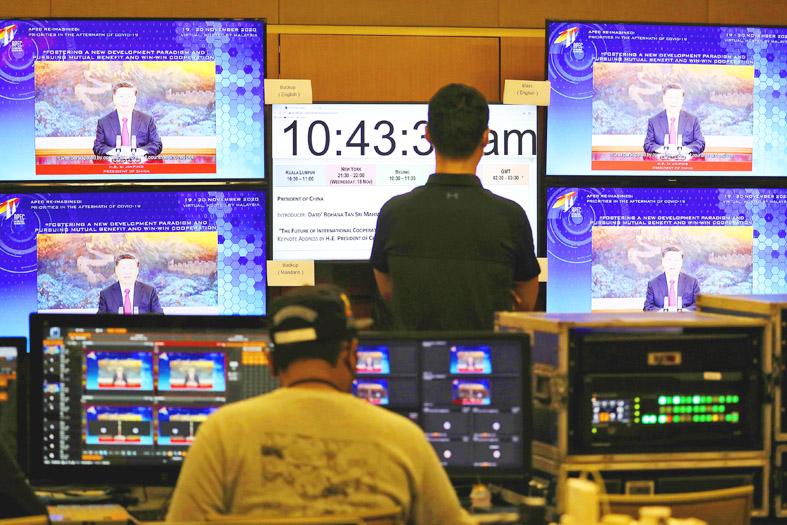China would consider joining a free-trade pact once championed by the US, but abandoned by US President Donald Trump, Chinese President Xi Jinping (習近平) said on Friday, as Beijing increasingly seeks to influence the global rules of commerce.
The Comprehensive and Progressive Agreement for Trans-Pacific Partnership (CPTPP) is an updated version of a giant deal originally backed by former US president Barack Obama as an effort to counter China’s rising influence in Asia.
Trump pulled out of it after winning the presidency in 2016 as he turned away from what he viewed as unfavorable multilateral deals, but 11 countries eventually agreed to sign the new version.

Photo: Reuters
Addressing an APEC summit, Xi said the grouping “must continue to promote regional economic integration and establish an Asia-Pacific free-trade zone at an early date.”
China “will actively consider joining” the CPTPP, he said, according to Chinese state media.
Trump attended this year’s virtual summit, the first time he has participated since 2017, as he continues to challenge his election defeat to US president-elect Joe Biden.
Xi’s comments came just days after Beijing and 14 other countries signed what would be the world’s biggest trade deal, the Regional Comprehensive Economic Partnership.
Taiwan has expressed an interest in joining the CPTPP, as it would be unlikely to gain membership in the China-dominated Regional Comprehensive Economic Partnership.
Singapore-based international trade expert Deborah Elms said that if China did join the trade pact, it might encourage others to follow.
“If Xi’s statement of interest is pushed forward in the coming weeks and months, it will, of course, lead to a lot of questions from current members, prospective members and others that are not thinking of CPTPP membership at all,” said Elms, executive director of the Asian Trade Centre.
Additional reporting by staff writer

Taiwan is projected to lose a working-age population of about 6.67 million people in two waves of retirement in the coming years, as the nation confronts accelerating demographic decline and a shortage of younger workers to take their place, the Ministry of the Interior said. Taiwan experienced its largest baby boom between 1958 and 1966, when the population grew by 3.78 million, followed by a second surge of 2.89 million between 1976 and 1982, ministry data showed. In 2023, the first of those baby boom generations — those born in the late 1950s and early 1960s — began to enter retirement, triggering

One of two tropical depressions that formed off Taiwan yesterday morning could turn into a moderate typhoon by the weekend, the Central Weather Administration (CWA) said yesterday. Tropical Depression No. 21 formed at 8am about 1,850km off the southeast coast, CWA forecaster Lee Meng-hsuan (李孟軒) said. The weather system is expected to move northwest as it builds momentum, possibly intensifying this weekend into a typhoon, which would be called Mitag, Lee said. The radius of the storm is expected to reach almost 200km, she said. It is forecast to approach the southeast of Taiwan on Monday next week and pass through the Bashi Channel

NO CHANGE: The TRA makes clear that the US does not consider the status of Taiwan to have been determined by WWII-era documents, a former AIT deputy director said The American Institute in Taiwan’s (AIT) comments that World War-II era documents do not determine Taiwan’s political status accurately conveyed the US’ stance, the US Department of State said. An AIT spokesperson on Saturday said that a Chinese official mischaracterized World War II-era documents as stating that Taiwan was ceded to the China. The remarks from the US’ de facto embassy in Taiwan drew criticism from the Ma Ying-jeou Foundation, whose director said the comments put Taiwan in danger. The Chinese-language United Daily News yesterday reported that a US State Department spokesperson confirmed the AIT’s position. They added that the US would continue to

The number of Chinese spouses applying for dependent residency as well as long-term residency in Taiwan has decreased, the Mainland Affairs Council said yesterday, adding that the reduction of Chinese spouses staying or living in Taiwan is only one facet reflecting the general decrease in the number of people willing to get married in Taiwan. The number of Chinese spouses applying for dependent residency last year was 7,123, down by 2,931, or 29.15 percent, from the previous year. The same census showed that the number of Chinese spouses applying for long-term residency and receiving approval last year stood at 2,973, down 1,520,